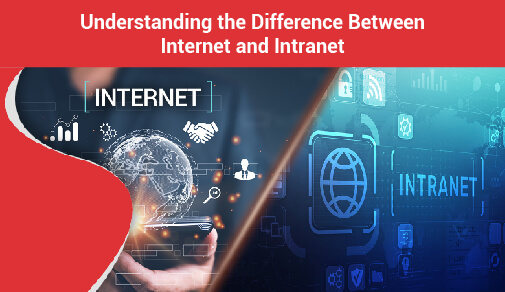Difference Between Internet and Intranet
-
34
-
06 Apr 2024
-
4 minutes

The internet and intranet are fundamental devices for correspondence and data partaking in the modern advanced world. Although the two expressions are utilized interchangeably as often as possible, they mean different things. An intranet is a confined network used by an association. The Internet is a public network that anybody can use. An intranet is normally set up for a particular reason, like sharing data or records inside an association. This article inspects the vital differentiation between intranets and the internet, as well as their highlights and possible advantages for improving inward correspondence inside associations.
What Is the Internet and How It Works?
Through the internet, anybody can access and trade data anywhere on the planet because of the worldwide organization of associated PCs. Its capabilities utilize the TCP/IP (Transmission Control Protocol/Internet Protocol) arrangement of conventions, which grants correspondence between different devices. A server gets a request from a client through the web when they type a web URL or direct a data search. After handling the request, the server returns the mentioned information to the user's device.
The internet works by interfacing networks together through a series of switches. A switch forwards packets of information between different networks, while also connecting devices within a single network segment. This enables computers to communicate with each other and access content stored on remote servers. After learning what is the internet, let's now move to how the internet works!
How the Internet Works
1. Data Transmission: Over the internet, data is sent in packets.
2. Protocols: Accurate data transmission and reception are guaranteed by TCP/IP protocols.
3. Servers: On servers, websites and other online services are housed.
4. ISPs: Internet service providers, or ISPs, make it easier to access the Internet.
5. Routing: Data packets are directed to their destinations via routers.
What Is an Intranet and How It Works?
An intranet is a secure internal network accessible only to authorized users within an organization. Unlike the public internet, it restricts access to internal information and resources. It leverages similar communication standards as the internet but within a controlled environment, enhancing security and protection. Intranets facilitate information sharing, document collaboration, and communication tools like group work and video conferencing.
How an Intranet Works:
1. Private Network: Limited to authorized users within an organization.
2. Internal Servers: Hosts the intranet content and applications.
3. Firewalls: Protect the intranet from external access.
4. User Authentication: Ensures only authorized users can access the network.
5. Customized Applications: Often includes company-specific tools and resources.
Inside an association, intranets are utilized for correspondence, report sharing, and cooperation. By giving staff individuals a unified stage to get to fundamental information and assets, they increment efficiency.
Key Differences Between Internet and Intranet
To completely use the upsides of both the internet and intranet, one should appreciate how they vary from each other. Let's understand the difference between internet and intranet.
| Aspect | Internet | Intranet |
| Accessibility | Publicly accessible | Restricted to authorized users within the organization |
| Purpose | Global communication and information sharing | Internal communication and resource management |
| Security | Vulnerable to external threats | More secure with restricted access |
| Connectivity | Worldwide connectivity through ISPs | Limited to organizational boundaries |
| Content | General information, public websites, social media | Company-specific information, internal documents |
How do the Internet and Intranets Improve Organizational Communication?
Organizational communication is improved by both the internet and intranets in various ways.
Internet
1. Worldwide Reach: Works with communication with clients and staff around the world.
2. Showcasing and Effort: Offers channels for customer care, online entertainment collaboration, and promoting.
3. Resource Accessibility: Gives simple admittance to an abundance of information and devices that can help in critical thinking and navigation.
Intranet
1. Unified Data: Offers a common and confidential source of information for a company.
2. Enhanced Collaborative Effort: Utilizing Stages, Discussions, and Texts to Foster Internal Communication
3. Improved Security: This brings down the chance of information breaks by restricting approved users' admittance to delicate data.
Pros and Cons of Using the Internet
Let's help you understand the pros and cons of using the internet. Do remember that uses of the internet in daily life will always outweigh the cons.
| Pros | Cons |
| Connects worldwide & shares information | Misinformation & fake news spread easily |
| Learning resources & educational tools | Cybersecurity threats like malware & phishing |
| Boosts productivity & efficiency | Digital addiction & time management issues |
| Entertainment & social connection | Cyberbullying & online harassment |
| Convenient online shopping | Privacy concerns & data misuse |
| Global awareness & cultural understanding | Echo chambers & confirmation bias |
Factors to Consider When Choosing Between Using the Internet and an Intranet
While choosing whether to utilize the Internet, an intranet, or both, associations ought to think about a few variables:
- Security Needs: Intranets offer more control and security for sensitive information.
- Accessibility Requirements: The internet is essential for global communication, while intranets are ideal for internal use.
- Cost: Maintaining an intranet may require more resources and infrastructure compared to internet-based services.
- User Base: Consider the size and location of the user base—global teams may benefit more from internet access.
- Purpose: Specify the main purpose, be it resource management, internal communication, or public outreach and involvement.
Therefore, you should always choose the best internet providers, such as the ACT internet provider to experience the best of the internet service.
Conclusion
Utilizing the benefits of both requires a comprehension of how the internet and intranet vary from each other. While intranets offer protected, interior organizations tweaked to an association's requirements; the internet offers an overall stage for correspondence and data sharing. Associations might better use these advancements to further develop correspondence and functional effectiveness by considering factors like security, openness, cost, and reason.






